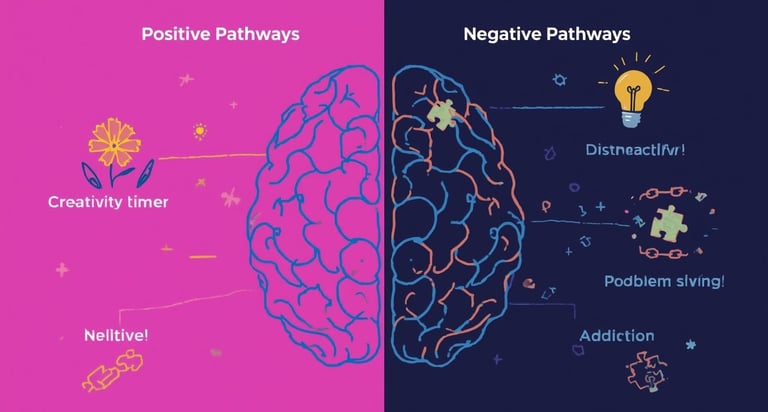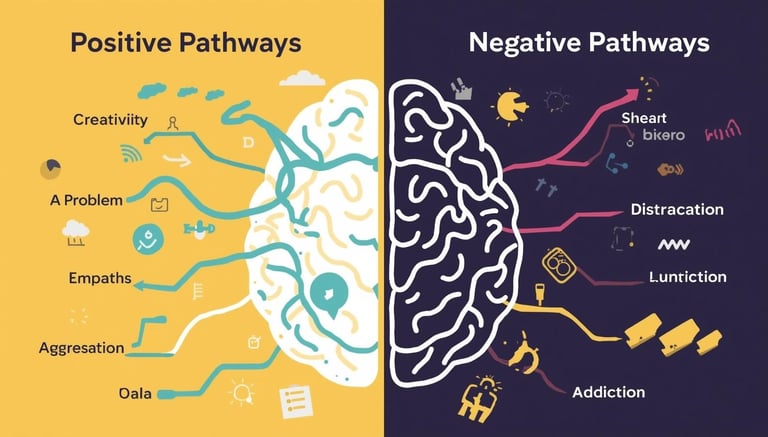Cognitive Development and Gaming: Exploring Positive and Negative Pathways
“How Online Gaming Shapes Young Minds – Unlocking Creativity, Memory, and Empathy While Avoiding Negative Cognitive Traps.” Part 3
Gajanan L. Bhonde
8/27/20258 min read


Introduction: The Intersection of Gaming and Cognitive Development
The relationship between gaming and cognitive development has garnered increasing attention in recent years, as video games have evolved from mere entertainment to multifaceted platforms that challenge cognitive functions. With the rise of sophisticated games featuring complex narratives, intricate problem-solving tasks, and interactive environments, players often engage in a variety of cognitive processes that can either enhance or hinder mental development. This modern gaming landscape presents both opportunities and challenges for cognitive growth, highlighting the need for a balanced understanding of its effects.
Research indicates that certain types of video games can promote essential cognitive skills such as attention span, critical thinking, and memory retention. For example, action games often require players to make rapid decisions based on visual stimuli, which can improve quick thinking and situational awareness. Puzzle and strategy games demand careful planning and foresight, potentially enhancing problem-solving abilities. Additionally, some role-playing games promote empathy and social skills by immersing players in narratives that require moral decision-making and interaction with diverse characters.
However, it is crucial to acknowledge the potential negative impacts of gaming as well. Excessive gameplay can lead to diminished attention spans, as players may become accustomed to the fast-paced nature of games that provide instant gratification. Furthermore, an overreliance on gaming for entertainment might hinder the development of real-world social skills, as face-to-face interactions are often replaced with virtual engagements. The balance between the cognitive benefits and drawbacks of gaming necessitates a nuanced analysis, inviting further exploration into how these experiences shape cognitive abilities within various age groups.
Positive Pathways: The Benefits of Gaming on Cognitive Skills
As our understanding of cognitive development continues to evolve, it is increasingly evident that gaming can play a significant role in enhancing various cognitive skills. Numerous studies indicate that engaging in certain video games can serve as an effective tool for brain training. These games are often designed to challenge the player’s memory, attention, and problem-solving abilities. For example, puzzle games require players to hone their cognitive functions as they strategize and assess different scenarios, leading to improved memory retention and enhanced critical thinking skills.
Moreover, gaming presents a unique opportunity for players to collaborate and communicate effectively in multiplayer settings. Team-based games require participants to work together to achieve common objectives, thereby fostering essential teamwork skills. In these environments, players learn how to share ideas, divide tasks efficiently, and encourage one another, translating these cooperative models into real-life team dynamics. Such experiences can cultivate better interpersonal skills, which are vital in both academic and professional settings.
In addition to fostering communication and teamwork, video games encourage adaptive thinking. Players often navigate rapidly changing scenarios that demand quick decision-making and flexibility. This aspect of gaming teaches individuals to think on their feet, make swift judgments, and adapt strategies in response to unforeseen challenges. As a result, players become adept at evaluating situations and modifying their approaches, which can enhance their problem-solving capabilities beyond the confines of the gaming environment.
Incorporating gaming into cognitive development discussions reveals its potential for providing significant benefits. Through enhanced memory, improved teamwork, and adaptive thinking practices, gaming emerges as a promising avenue for fostering critical cognitive skills in individuals across various age groups.
Negative Pathways: The Drawbacks of Gaming on Cognitive Functions
The relationship between gaming and cognitive development is complex, with several potential drawbacks that merit attention. One of the most significant concerns is the association between competitive gaming elements and increased aggression. Research has suggested that immersion in high-stakes gaming environments, often characterized by intense competition and conflict, can lead to heightened levels of frustration and aggression in players. This aggressive behavior may translate into real-world interactions, affecting interpersonal relationships and social dynamics.
Furthermore, gaming can introduce substantial distractions that interfere with daily life and cognitive functionalities. Engaging in gaming activities for prolonged periods can detract from essential responsibilities such as studying, working, or even engaging in face-to-face social interactions. These distractions can impede an individual's ability to focus on tasks that require sustained attention, potentially leading to decreased academic or professional performance. The instant gratification that many games provide can condition players to seek immediate rewards in other areas of life, which may hinder their ability to concentrate on long-term goals.
Lastly, the instant gratification often associated with gaming experiences can diminish patience and perseverance. Players frequently find themselves in scenarios where they can achieve objectives with minimal effort and time, which fosters an expectation of instant success. This expectation can bleed into other areas of life, where challenges require time, effort, and resilience to overcome. As a result, young gamers may struggle with delayed gratification and problem-solving in situations that do not yield immediate results, thereby impacting cognitive development negatively. Collectively, these factors cast a shadow on the otherwise enriching potential of gaming, highlighting the need for a balanced approach to gaming habits.
Cognitive Impact of Gaming on Attention Span
The relationship between gaming and attention span is a complex and multifaceted subject, revealing a spectrum of cognitive impacts derived from various genres and styles of gameplay. Research has shown that fast-paced games, which typically require quick reflexes and rapid decision-making, may contribute to a reduction in overall attention span. These games often engage a player's focus intensely during play but can result in challenges when transferring that focus to slower-paced tasks or real-life activities, potentially diminishing the ability to concentrate on mundane or less stimulating situations.
Conversely, certain genres of video games have been associated with improvements in focus and attention under specific conditions. For instance, strategy games or puzzle-solving games necessitate sustained concentration, critical thinking, and planning. These games can encourage players to maintain their attention over longer periods, enhancing their cognitive flexibility and their capacity to manage multiple tasks. Studies suggest that engaging in these types of games may enhance an individual’s ability to prioritize tasks and remain focused amidst distractions.
Ultimately, while there is evidence suggesting that certain gaming experiences can lengthen or shorten attention spans, further research is needed to draw more definitive conclusions about these dynamics and their implications for cognitive development.
The Role of Decision-Making in Gaming Experiences
Decision-making is a crucial component of gaming, impacting the player's experience and skill development. Many games require players to engage in strategic thinking, as they must constantly evaluate the best course of action to achieve specific objectives. This form of strategic decision-making can enhance cognitive skills by fostering critical thinking, problem-solving abilities, and the ability to anticipate outcomes based on previous experiences.
Additionally, gaming often involves time-sensitive situations where players must make rapid decisions. These high-pressure scenarios encourage players to rely on their instincts and assess risks quickly. Studies have shown that this practice can lead to improved decision-making under stress, which is transferable to real-world situations, such as in emergency response or competitive environments. Furthermore, as players navigate diverse scenarios, they become adept at predicting opponent behavior and adapting their strategies accordingly, honing their interpersonal decision-making skills.
However, it is essential to acknowledge the potential downsides. While gaming can improve some decision-making abilities, excessive emphasis on quick or rash choices may adversely affect how players make real-life decisions. Players might develop a tendency to rush through choices without fully considering the consequences, especially if they become accustomed to scenarios where the penalty for failure is minimal or virtual. This aspect emphasizes the importance of the type of games played and the balance between developing quick reflexes and maintaining thoughtful contemplation.
In conclusion, the role of decision-making in gaming is multifaceted, encompassing both advantages and challenges. While strategic elements present in various games can enhance cognitive skills and improve real-life decision-making, players must remain aware of the potential for negative impacts arising from hasty choices. Through mindful engagement, players can leverage their gaming experiences to boost their decision-making capabilities positively.
Scientific Insights: Balancing Gaming for Cognitive Benefits
The relationship between gaming and cognitive development has been a subject of extensive scientific inquiry. Numerous studies have shown that moderate gaming can enhance various cognitive functions such as problem-solving skills, spatial awareness, and even memory retention. However, the key to reaping the benefits lies in striking a balance. Excessive gaming can lead to negative outcomes, including addiction and impaired social interactions. Therefore, it is crucial to establish guidelines that can help gamers navigate this landscape effectively.
Experts recommend limiting gaming sessions to a maximum of one to two hours per day, ensuring that it does not interfere with essential daily activities such as homework, exercise, and socialization. This moderated approach enables players to enjoy the cognitive benefits of gameplay, such as improved attention span and quicker decision-making skills, while minimizing the risks associated with excessive screen time. Incorporating regular breaks during gaming sessions can further enhance cognitive functioning by allowing the brain to rest and process information more effectively.
Additionally, the type of games played can significantly influence cognitive development. Puzzle-based games and strategy-driven experiences generally foster critical thinking and enhance logical reasoning, whereas fast-paced action games may improve reaction times and hand-eye coordination. Gamers are therefore encouraged to diversify their gaming experiences, opting for titles that challenge their intellect and stimulate creativity. This variety can also prevent monotony and keep the gaming experience engaging and educational.
Ultimately, the goal should be to transform gaming into a brain-boosting tool. By adhering to reasonable time limits, selecting the right genres of games, and incorporating breaks, players can maximize cognitive benefits while reducing potential negative effects. Through conscious management of gaming habits, individuals can cultivate not only a love for gaming but also an enriching environment for cognitive growth.
Conclusion: Navigating the Cognitive Landscape of Gaming
In analyzing the relationship between cognitive development and gaming, it is evident that this multifaceted interaction yields both positive and negative outcomes. Throughout this blog post, we have highlighted the potential benefits of gaming, such as improved problem-solving skills, enhanced spatial awareness, and better memory retention. These cognitive advantages can be particularly appealing in an increasingly digital world where quick thinking and adaptability are essential. Furthermore, certain types of games, especially those involving strategy and teamwork, manage to cultivate social skills and foster collaboration among players, promoting a shared cognitive growth environment.
However, it is equally important to consider the adverse effects that gaming can impart. Extensive gameplay can lead to issues such as diminished attention spans, increased impulsivity, and potential social isolation. These drawbacks can significantly impact an individual's overall cognitive development if gaming is not approached judiciously. The dual impact of gaming on cognitive abilities necessitates a balanced perspective, urging players, parents, and educators to implement responsible gaming habits. By establishing reasonable limits and encouraging game choices that stimulate critical thinking and creativity, it is possible to harness the benefits while minimizing the downsides.
Ultimately, the dialogue surrounding gaming and cognitive development must remain open and ongoing. It is crucial for stakeholders to engage in discussions that address both the potential and pitfalls of gaming experiences. With a deliberate and conscientious approach to gaming, individuals can navigate the cognitive landscape effectively, ensuring that their gaming choices enrich rather than detract from cognitive growth. As we continue to explore this dynamic field, the integration of strategies that promote healthy gaming practices will be essential in fostering cognitive development in various contexts.










